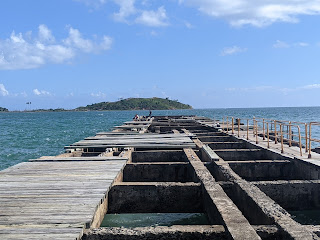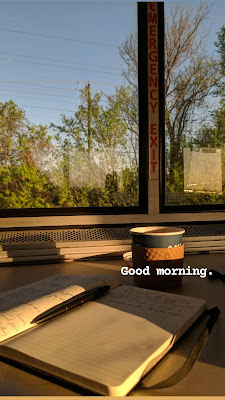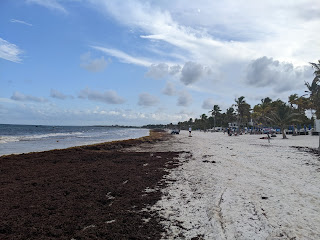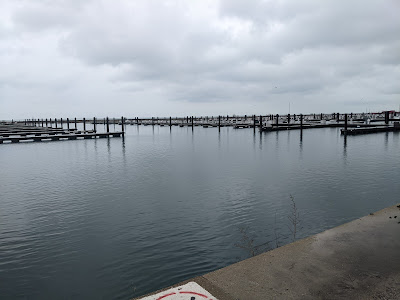11 Days in Puerto Rico
Walking along the beach just outside my rental in Humacao, Puerto Rico during the evening of my first day on the island, I was struck by an overwhelming feeling that I’ve been here before. “I know this town” I thought as I passed ramshackle houses gutted by Maria years ago and the interspersed new construction on stilts.
They looked just like the small towns on Florida’s gulf coast that never really bounced back from various hurricanes over the years. The same bungalow beach bars dot the main drag just a few blocks over with locals only during the week and an influx of visitors drinking and dancing on a Friday night. The same dirty sand on the beaches, often overgrown with various vines and grasses, frequently entirely void of humans. The same surprisingly expensive seafood restaurants implying they have only the freshest seafood, but there must be more to that story because there’s salmon on the menu. There are no salmon in this part of the ocean.
I know this town. I’ve been here before.
 |
| A hurricane damaged pier |
It was a surprising feeling because I actually haven’t been here before. In fact, it starkly contrasted my realization the prior night that Puerto Rico is much more like a foreign country to me than anywhere else I’ve been in the USA. Were it not for the distinctly American brands dotting the roads--McDonalds, Burger King, Checkers, Walmart, Home Depot--and the use of US dollars, I would have guessed that I was in another country.
It hadn’t yet occurred to me, but this was also because many of the differences between Puerto Rico and the contiguous US cities I’ve lived in are the same differences that have made me uncomfortable in other countries.
The tiny mountain roads that I took from San Juan out to the eastern coast were incredibly tiny, probably predating the car’s transportation domination. Horses tied up to fences every so often gave a hint that the takeover isn’t complete. The roads were all paved, and mostly painted like modern roads, except that many of them had no center line because there wasn’t enough room for two full lanes. They remind me of tiny roads in the German Alps, or on the side of Cape Town’s Table Mountain, or in the Scottish Highlands. Two cars can pass by each other, but only as long as they both agree to edge one side of themselves just outside the painted edges of the road, and occasionally off the pavement entirely. At first I clenched my whole body when I had to drive past another car. Eventually I learned to clench just my butthole.
The grocery stores carried a lot of the foods I’d expect to see in mainland America, but at much higher prices. The cheaper produce and locally prepared items were largely unfamiliar to me, or at least things I didn’t know how to cook with, like plantains. I bit the bullet and stuck to the foods I knew, compromising with myself by being more adventurous at restaurants. It reminded me of Japan, where the fruits I recognized were incredibly expensive. Oranges and strawberries were reliably a dollar or more per fruit, and melons were at least twenty dollars each. Radishes, mushroom varieties, and plenty of other options were cheaper, but I didn’t even know what to call them to search for recipes, let alone come up with something on my own.
Most notably, I didn’t speak the local language. Puerto Rico is officially a Spanish speaking country. Many people do speak English, but many do not. It seemed like most of the people I encountered outside of San Juan fell into the latter group. A few explicitly told me so. It has this in common with nearly every country on Earth.
 |
| what used to be a swimming pool in the middle of the rain forest |
So my experience in Puerto Rico was of two categories: the familiar and the familiarly unfamiliar.
On the one hand, I went hiking in a National Forest--the only tropical rainforest in the US--on trails that date back to the New Deal and were built by the Civilian Conservation Corps. On the other hand, I learned the hard way that the signs at the beach near one of my AirBnbs were actually warning you NOT to swim on account of the incredibly strong undertow. I got up to knees in water and before realizing why no one else was taking a dip.
Familiar and unfamiliar. At home and abroad. Comfortable and slightly nerve wracking. Even if neither of those extremes are particularly novel in my life at this point, the blending of them is.
For me, and perhaps many Americans, rural Puerto Rico presents a unique opportunity to practice being a tourist without needing a passport. A chance to dip out on much of the dominant culture of the continental USA. To sit in a room where you could in no way be confused for a local. To immerse yourself in the uncomfortable and then cool off at a Walmart where the self checkout will speak in Spanish, but the text is still in English.
As I leave Puerto Rico today, I’m struck with another overwhelming feeling: I’ll be here again. I have a lot more practicing to do.





Comments
Post a Comment